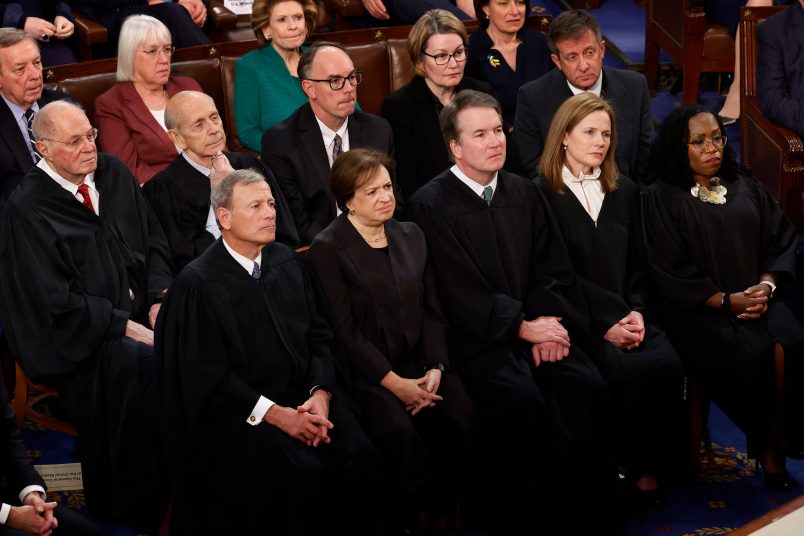A recent decision by the North Carolina Supreme Court suddenly put one of the U.S. Supreme Court’s biggest cases of this term on shaky ground.
The state court, with its brand new Republican majority, announced that it would rehear the redistricting dispute at the heart of Moore v. Harper, an election law case that experts have warned could reshape how American democracy functions. North Carolina’s old, Democratic-majority bench had tossed out gerrymandered maps produced by the state’s Republican legislature just one year ago, and the Supreme Court had heard oral arguments on the case in December 2022.
In response to the state Supreme Court majority’s decision to rehear the case, the two Democratic justices left on the bench penned a blistering response, calling the move a “power grab” and a “radical break with 205 years of history.”
A new decision by the state court may render moot the case the Supreme Court is currently mulling.
North Carolina legislators had asked the state court to rehear the case, prompting court watchers to ask: Why would these Republicans risk removing the case from the Supreme Court’s hands after they’d managed to get the independent state legislature theory before such a favorable bench?
The theory, in its maximal form, empowers state legislatures to control voting laws, election procedures and redistricting to the exclusion of all other state-level entities, including courts, constitutions and even gubernatorial vetoes.
Some surmised that the legislators were predominantly acting out of self interest: perhaps they’re content to take the favorable district maps, and can leave reshaping how American democracy works for another day.
“The state legislators recognized that the state Supreme Court is likely to do exactly what they want,” Doug Spencer, an associate professor at the University of Colorado Law School, told TPM. “They don’t have grand hopes for the independent state legislature theory, they just want their maps passed.”
“Gerrymandering the legislature itself is probably a bigger motivation for them than the independent state legislature theory,” added Carolyn Shapiro, law professor and founder of Chicago-Kent’s Institute on the Supreme Court of the United States.
But others thought, after some of the right wing justices’ lukewarm reactions during oral arguments, that the legislators no longer assumed that they’d win — or at least, that they might not get the sweeping win for which they’d hoped.
The Supreme Court will certainly get another chance to rule on the theory, and may still rule on it in this case. If the North Carolina Supreme Court, as expected, reverses the decision and rules in the legislators’ favor, the case might be moot — but experts suspect that the U.S. Supreme Court may not let the opportunity pass without expounding on the theory.
“I’m not convinced the Court will moot the case,” Spencer said. “They may decide that they want to write the opinion anyway — and it would behoove them write it before North Carolina rules.”
Some of the justices expressed their acute interest in deciding the ISLT question as recently as last spring. Even given the state court’s move, the justices could rush out an opinion in the North Carolina case, skirting the potential mootness issue. There are also exceptions to mootness particularly in election-related cases, pointed out Shapiro.
While many legal scholars fear that the justices could use the theory to completely upend federal elections — and put them solely in the hands of brutally gerrymandered state legislatures that often govern far to the right of their constituents — they still want to know the damage sooner rather than later.
“This question is coming up frequently, and these kinds of cases come fast and furious before major elections,” Jon Sherman, litigation director and senior counsel at the Fair Elections Center, told TPM. “It’s in the country’s best interest to have this resolved not in the context of a massively contentious and fraught presidential election and certainly not in post-election litigation.”
Even if the North Carolina case does slip from the Supreme Court’s grasp, it’ll inevitably hear another case centered on the theory at some point. Just last fall, Ohio Republicans asked the Supreme Court to review the Ohio Supreme Court’s striking down of their maps through the lens of the independent state legislature theory. The Court has yet to take it up — so far.
“They’re just lifting the blade of the guillotine again. It’s still about to come down,” Sherman said. “It’s still there, it’s not like they packed up the guillotine and put it into storage.”







Looks like there will be a lot of clean up required on the mess the current activist court is creating (hopefully sooner then later).
Left unsaid: in the 2022 election the NC (elected) supreme court went from a 4-3 D-R majority to a 5-2 R-D majority. Elections matter.
Wait, they’re what? This is not the plot twist on this I expected.
By what mechanism can the state supreme court even do this? And could this really lead to the SCOTUS throwing out something they’re already working on?
Considering the majority lied to get the job, and have already unleashed unlimited untraceable money into our politics, whatever legislation required to keep a white protestant minority in power in this country will be made up, delivered, signed into law and breathlessly misinterpreted by a paid for press.
Even the ISL theory is (logically speaking at least) subject to federal court review, so it will be a while before, say, state legislatures simply make it illegal for black people to vote. Can federal courts rule on whether something violates a particular state’s constitution?